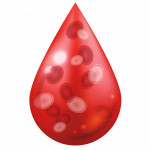Having higher levels of “bad” low-density lipoprotein (LDL) cholesterol is associated with a better response to hepatitis C (HCV) treatment in people infected with both HIV and HCV, say the authors of a study published in the May 11 issue of AIDS. This raises the question of whether a problematic side effect of many antiretroviral (ARV) drugs—increases in LDL—may actually be advantageous for people living with HIV undergoing treatment for HCV.
In people infected with HCV, but not HIV, studies have found that having a higher total cholesterol level and higher levels of LDL cholesterol is associated with having a sustained virologic response (SVR) to HCV treatment. An SVR is defined as an undetectable HCV viral load six months after completing HCV treatment. José del Valle, MD, from the Hospital Universitario de Valme in Sevilla, Spain, and his colleagues set out to determine whether the same thing would be true in people coinfected with HIV and HCV. From a cohort of 3,564 coinfected patients, del Valle’s team analyzed data from 339 who had received HCV treatment.
In all, 39 percent of the patients who were treated achieved an SVR. People with a higher LDL cholesterol level (above 100 mg/dL) were more likely to have an SVR. This result was statistically significant, meaning that the difference was too great to have occurred by chance. Total cholesterol, however, did not influence whether people had an SVR. Given the beneficial impact of higher LDL on HCV treatment, del Valle’s team concludes that further analysis of the use of various ARV drugs most likely to elevate LDL levels should be conducted.
Advertisement
Advertisement
Advertisement






1 Comment
1 Comment